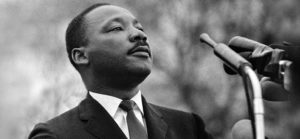
If I’m dreaming
Then just let me sleep
Don’t wake me up
Till my dream is complete
(Edwards, B.D. & Brown, S., 1991)
Today we celebrate the life and legacy of Dr. Martin Luther King, Jr. From the youngest to the oldest, if you know one thing about him, it’s that he had a dream. You know that on August 28, 1963 during the March on Washington for Jobs and Freedom he stood before a crowd of 250,000 people in front of the Lincoln Memorial and delivered one of the most notable, important, and relevant speeches of our time.
“I Have a Dream”
Because of the speech’s notoriety, it is likely difficult for some to disconnect Dr. King, the man, from the dream. I know it pops into my mind in advance of his countless achievements, public addresses, and the civil rights successes he championed. So, I thought to myself, what makes “the dream” paramount?
Dream
drēm
(noun)
a series of thoughts, images, and ideas occurring in one’s mind during sleep
(verb)
anticipate, plan the possibility of doing something
The word dream is both a noun and a verb. As a noun, it is merely a vision; or, as the song goes, “…a simple fantasy, that I wish was reality.” It’s an intangible imaginary “thing” that happens while one is asleep.
Most people are familiar and comfortable with the “ideas” encapsulated in his speech.
“…sons of former slave owners will be able to sit down together at the table of brotherhood.”
“…the state of Mississippi…will be transformed into an oasis of freedom and justice.”
“… children will one day live in a nation where they will not be judged by the color of their skin but by the content of their character.”
“… little black boys and black girls will be able to join hands with little white boys and white girls as sisters and brothers.”
Unless you’ve watched or read the speech transcript in its entirety then the aforementioned could have you arrive at the conclusion that Dr. King’s dream has been realized. You could argue that Black people can sit in the front of the bus, drink out of undesignated water fountains, dine in fine restaurants, walk through the front entrances of buildings, sleep in expensive hotels, and shop in exclusive boutiques. You can reason that programs have been designed to ensure Black people are not denied access to quality education, employment, and housing. And if that isn’t enough, the Kumbaya to end all campfire sing-a-longs; not only do Black people have voting rights, but a Black man was President of the United States for eight years.
Yay! The dream is a reality…except, no, it isn’t.
Dr. King’s dream was more than those ideas which, as the definition tells us, occur while asleep. His dream was about action. He told us not to be satisfied with the “idea” of freedom and equality
as long as the Negro is the victim of the unspeakable horrors of police brutality.
His dream was that
…we will be able to work together, to pray together, to struggle together, to go to jail together, to stand up for freedom together…
and
…transform the jangling discords of our nation into a beautiful symphony of brotherhood.
He wanted us to do more than simply imagine equality and justice for all. For 5 years until he was assassinated in 1968, Dr. King inspired others to embrace the meaning of the word as a verb. I wasn’t born yet, so I don’t know if the actionable dream died with him immediately on that Memphis balcony or if it took a few minutes, days, months, or years for the country to fall back asleep.
What I do know is we need to wake up. In this new Jim Crow Era, Black people are “still sadly crippled by the manacles of segregation and the chains of discrimination.” While we imagined what it would be like if we all got along, Black people are still subjected to the cruelty of racism and discrimination in their communities, workplaces, and educational institutions. While we were sleeping Black people were still being unjustifiably brutalized and murdered by law enforcement with little consequence at best and no consequence at worst.
While many thought things were different, a segment of society stopped hiding their hatred, racism, and bigotry and spread it freely.
So, we need to move from idea to action. Consider, as Dr. King did, a nation in which systemic racism no longer has a chokehold around the neck of justice. Contemplate ways you can stop hitting the snooze button and wake up from an American Dream that for some is still a nightmare. Then, conceive an actionable plan that demonstrates your understanding and commitment to achieving liberty and justice for all.